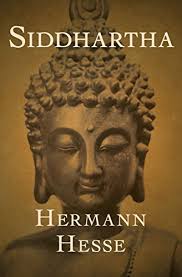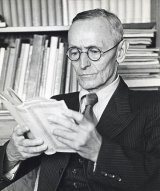Siddhartha Page #2
Siddhartha is a novel by Hermann Hesse that deals with the spiritual journey of self-discovery of a man named Siddhartha during the time of the Gautama Buddha. The book, Hesse's ninth novel, was written in German, in a simple, lyrical style.
Genre: Fiction
Genre: Fiction
- Year:
- 1922
- 3,931 Views
Surely, many verses of the holy books, particularly in the Upanishades of Samaveda, spoke of this innermost and ultimate thing, wonderful verses. "Your soul is the whole world", was written there, and it was written that man in his sleep, in his deep sleep, would meet with his innermost part and would reside in the Atman. Marvellous wisdom was in these verses, all knowledge of the wisest ones had been collected here in magic words, pure as honey collected by bees. No, not to be looked down upon was the tremendous amount of enlightenment which lay here collected and preserved by innumerable generations of wise Brahmans.-- But where were the Brahmans, where the priests, where the wise men or penitents, who had succeeded in not just knowing this deepest of all knowledge but also to live it? Where was the knowledgeable one who wove his spell to bring his familiarity with the Atman out of the sleep into the state of being awake, into the life, into every step of the way, into word and deed? Siddhartha knew many venerable Brahmans, chiefly his father, the pure one, the scholar, the most venerable one. His father was to be admired, quiet and noble were his manners, pure his life, wise his words, delicate and noble thoughts lived behind its brow --but even he, who knew so much, did he live in blissfulness, did he have peace, was he not also just a searching man, a thirsty man? Did he not, again and again, have to drink from holy sources, as a thirsty man, from the offerings, from the books, from the disputes of the Brahmans? Why did he, the irreproachable one, have to wash off sins every day, strive for a cleansing every day, over and over every day? Was not Atman in him, did not the pristine source spring from his heart? It had to be found, the pristine source in one's own self, it had to be possessed! Everything else was searching, was a detour, was getting lost. Thus were Siddhartha's thoughts, this was his thirst, this was his suffering. Often he spoke to himself from a Chandogya-Upanishad the words: "Truly, the name of the Brahman is satyam--verily, he who knows such a thing, will enter the heavenly world every day." Often, it seemed near, the heavenly world, but never he had reached it completely, never he had quenched the ultimate thirst. And among all the wise and wisest men, he knew and whose instructions he had received, among all of them there was no one, who had reached it completely, the heavenly world, who had quenched it completely, the eternal thirst. "Govinda," Siddhartha spoke to his friend, "Govinda, my dear, come with me under the Banyan tree, let's practise meditation." They went to the Banyan tree, they sat down, Siddhartha right here, Govinda twenty paces away. While putting himself down, ready to speak the Om, Siddhartha repeated murmuring the verse: Om is the bow, the arrow is soul, The Brahman is the arrow's target, That one should incessantly hit.
Translation
Translate and read this book in other languages:
Select another language:
- - Select -
- 简体中文 (Chinese - Simplified)
- 繁體中文 (Chinese - Traditional)
- Español (Spanish)
- Esperanto (Esperanto)
- 日本語 (Japanese)
- Português (Portuguese)
- Deutsch (German)
- العربية (Arabic)
- Français (French)
- Русский (Russian)
- ಕನ್ನಡ (Kannada)
- 한국어 (Korean)
- עברית (Hebrew)
- Gaeilge (Irish)
- Українська (Ukrainian)
- اردو (Urdu)
- Magyar (Hungarian)
- मानक हिन्दी (Hindi)
- Indonesia (Indonesian)
- Italiano (Italian)
- தமிழ் (Tamil)
- Türkçe (Turkish)
- తెలుగు (Telugu)
- ภาษาไทย (Thai)
- Tiếng Việt (Vietnamese)
- Čeština (Czech)
- Polski (Polish)
- Bahasa Indonesia (Indonesian)
- Românește (Romanian)
- Nederlands (Dutch)
- Ελληνικά (Greek)
- Latinum (Latin)
- Svenska (Swedish)
- Dansk (Danish)
- Suomi (Finnish)
- فارسی (Persian)
- ייִדיש (Yiddish)
- հայերեն (Armenian)
- Norsk (Norwegian)
- English (English)
Citation
Use the citation below to add this book to your bibliography:
Style:MLAChicagoAPA
"Siddhartha Books." Literature.com. STANDS4 LLC, 2024. Web. 25 Apr. 2024. <https://www.literature.com/book/siddhartha_24>.




Discuss this Siddhartha book with the community:
Report Comment
We're doing our best to make sure our content is useful, accurate and safe.
If by any chance you spot an inappropriate comment while navigating through our website please use this form to let us know, and we'll take care of it shortly.
Attachment
You need to be logged in to favorite.
Log In